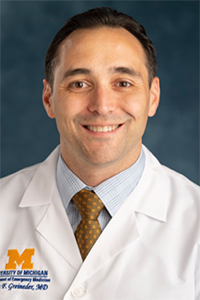Demystifying the SAEM Foundation Grant Review Process (Grants Committee Sponsored)
Authors
-

Elizabeth Burner, MD, MPH, PhD
Associate Professor, Clinical Emergency Medicine
University of Southern California / Los Angeles General Medical Center
Elizabeth Burner, MD, MPH, PhD, is an Associate Professor of Clinical Emergency Medicine at the Keck School of Medicine of the University of Southern California, Research Director for the Department of Emergency Medicine, and a Faculty Instructor with the SC-CTSI Workforce Development core. In 2013, Dr. Burner joined the faculty at the Keck School and has worked clinically in the emergency department at the LAC+USC hospital, the Jail Urgent Care based in the LA County Twin Towers Correctional Facility, as well as several community hospitals in the Los Angeles area. Dr. Burner's research interests center on investigating emergent health communication tools to reach health disparity groups, and directing patients to chronic care and medical homes as appropriate. She is committed to engaging patients in healthier lifestyles. She conducts mixed methods research to better understand the viewpoints of marginalized populations, particularly urban Latino immigrants. Her work has been supported by several NIH, institutional, and local grants. -

Bryn Mumma, MD, MAS
Member-at-Large
University of California, Davis
I am honored to be considered for the Society for Academic Emergency Medicine (SAEM) Board of Directors. SAEM has been an invaluable foundation for my career, providing mentorship, opportunities, and a community that have shaped my path in academic emergency medicine.
My academic journey began at the University of Pennsylvania School of Medicine and continued through the University of Pittsburgh Affiliated Residency Program. I completed a Research Fellowship at UC Davis, where I earned an M.A.S. degree in Clinical Research and joined the faculty. My research in cardiovascular emergencies with a focus in sex and gender disparities has been funded by both the NIH and private foundations. I have co-authored clinical guidelines for SAEM Guidelines for Reasonable and Appropriate Care in Emergency Medicine (GRACE) and the American Heart Association. I am currently the Director of the Women in Medicine and Health Sciences program for the UC Davis School of Medicine, Physician Lead for the Emergency Medicine Data Curation Unit, and Chair of the Diversity, Inclusion, and Equity in Emergency Medicine Research Committee. This combination of leadership roles has given me the ability to develop a strategic vision, collaborate with multidisciplinary teams, and implement data-driven changes while promoting equity for faculty, trainees, and patients.
I have been an active SAEM member since I was a medical student, regularly attending the SAEM Annual Meeting and participating on committees and task forces. I recently completed terms as Chair of two important SAEM committees: the Bylaws Committee and the Grants Committee. On the Bylaws Committee, I updated the SAEM Bylaws with focus on inclusivity for all members of the EM community and implemented periodic review of the SAEM Bylaws, policies, and position statements. I also developed a deep understanding of SAEM’s governance and commitment required from Board members. As Chair of the Grants Committee, I not only coordinated the successful review of a record number of applications to the SAEM Foundation but also restructured our application materials to lay the foundation for expansion of our grants portfolio. As a prior member of SAEM Foundation Board of Trustees, I also understand the vital connection between SAEM and the SAEM Foundation, which together have been instrumental in in launching and advancing careers in emergency medicine research.
Serving on the Board of Directors would be a natural progression in my commitment to giving back to this organization. My goal is to use my own knowledge and experiences to uplift others, providing them with opportunities to grow and succeed. As Emergency Medicine faces a rapidly evolving landscape—marked by the recent workforce report, unprecedented clinical volumes and patient boarding, and pressures on academic funding, and integration of artificial intelligence technology—SAEM’s leadership is critical to shaping our specialty’s future and supporting its members. I will actively seek ideas and feedback from all members, ensuring that everyone contributes to shaping a shared vision for our future.
I am committed to helping SAEM foster a supportive community, engage the next generation of Emergency Medicine physicians, and drive research that will advance care for our patients. As a well-rounded academic emergency medicine physician, my experience in research, education, and faculty development will enable me to be a strong contributor to the SAEM Board of Directors and achieve all aspects of the SAEM strategic plan.
I would be honored to serve as a member of the Board of Directors of SAEM and appreciate your support. -
Sophie Terp, MD
-

Taylor McCormick, MD, MSc
Denver Health
-

Colin Greineder, MD, PhD
Assistant Professor
University of Michigan
Colin Greineder, MD, PhD, attended the Yale School of Medicine and completed Emergency Medicine residency at the University of Michigan. After a year working in the community, he returned to academia to pursue a PhD in Pharmacology and post-doctoral fellowship at the University of Pennsylvania. Throughout this long period of scientific training, Dr. Greineder continued to work as an attending in a variety of academic and community ERs, including UPenn, Thomas Jefferson, Geisinger Medical Center, and the Crozer-Keystone Health System. He was awarded a K08 Career Development award from the NHLBI and returned to Michigan Medicine in 2018 as a tenure track faculty in Emergency Medicine and Pharmacology. Dr. Greineder’s laboratory focuses on development of novel pharmacologic therapies for the treatment of emergent ischemic, thrombotic, and inflammatory disorders. The primary focus is affinity ligand delivery of biotherapeutics to endothelial cells as a means of restoring their homeostatic functions and elucidating their role in disease pathogenesis. Additional interests include pharmacokinetic modeling, coagulofibrinolytic changes in critical illness, and risk stratification and management of venous thromboembolism.
Related Media
-
Leaping, Lugging, and Lasting: Emergency Medicine Leadership Emerging From the Pandemic (Faculty Development Committee Sponsored)
-
Not Enough Ice and Too Much Fire: Building Emergency Care Resilience in a Changing Climate
-
Abstract: Lightning Oral - Education 2
-
How Prehospital Severe Stroke Screening Impacts Patients and Systems of Care: A Debate (Neurologic EM and Emergency Medical Services Interest Group Sponsored)
